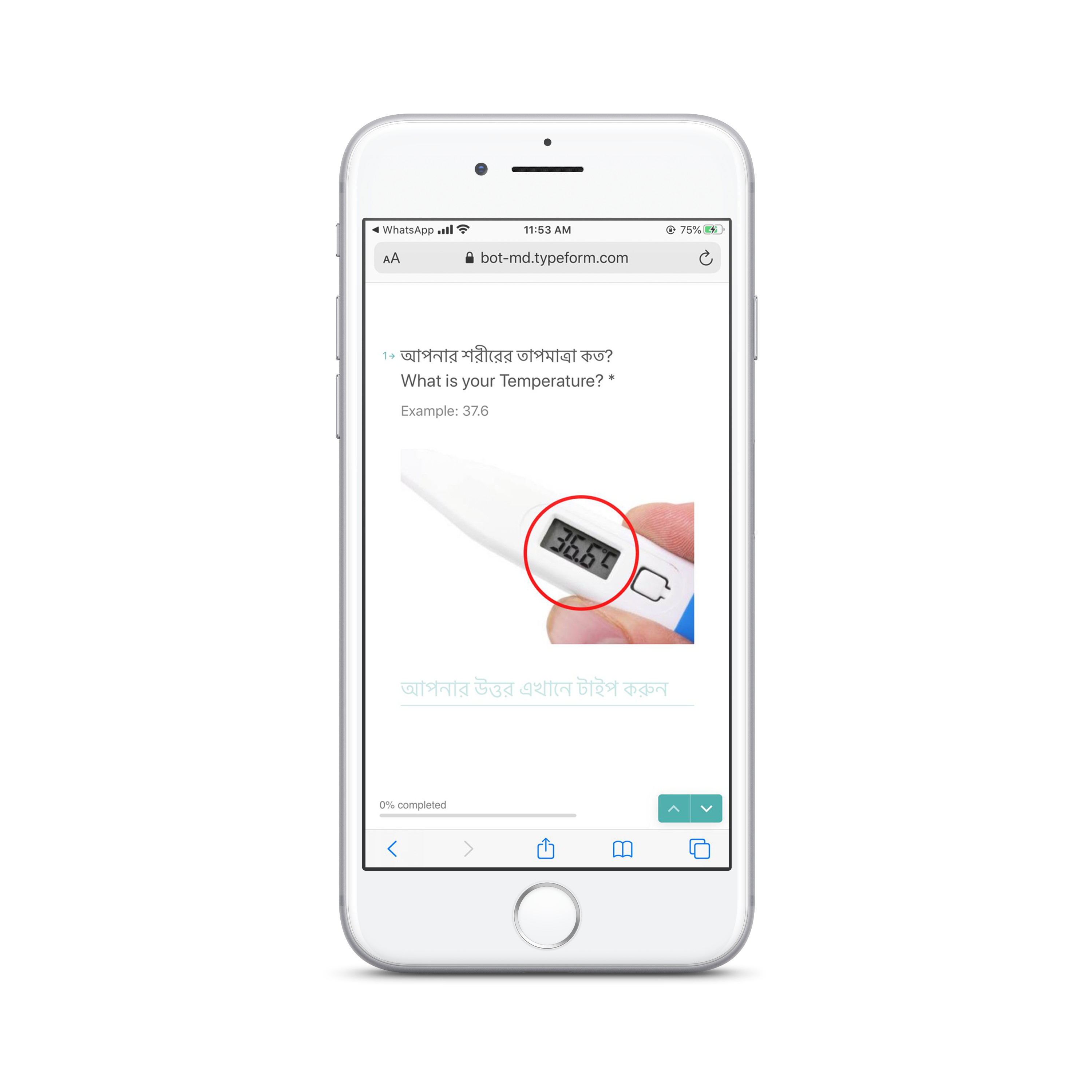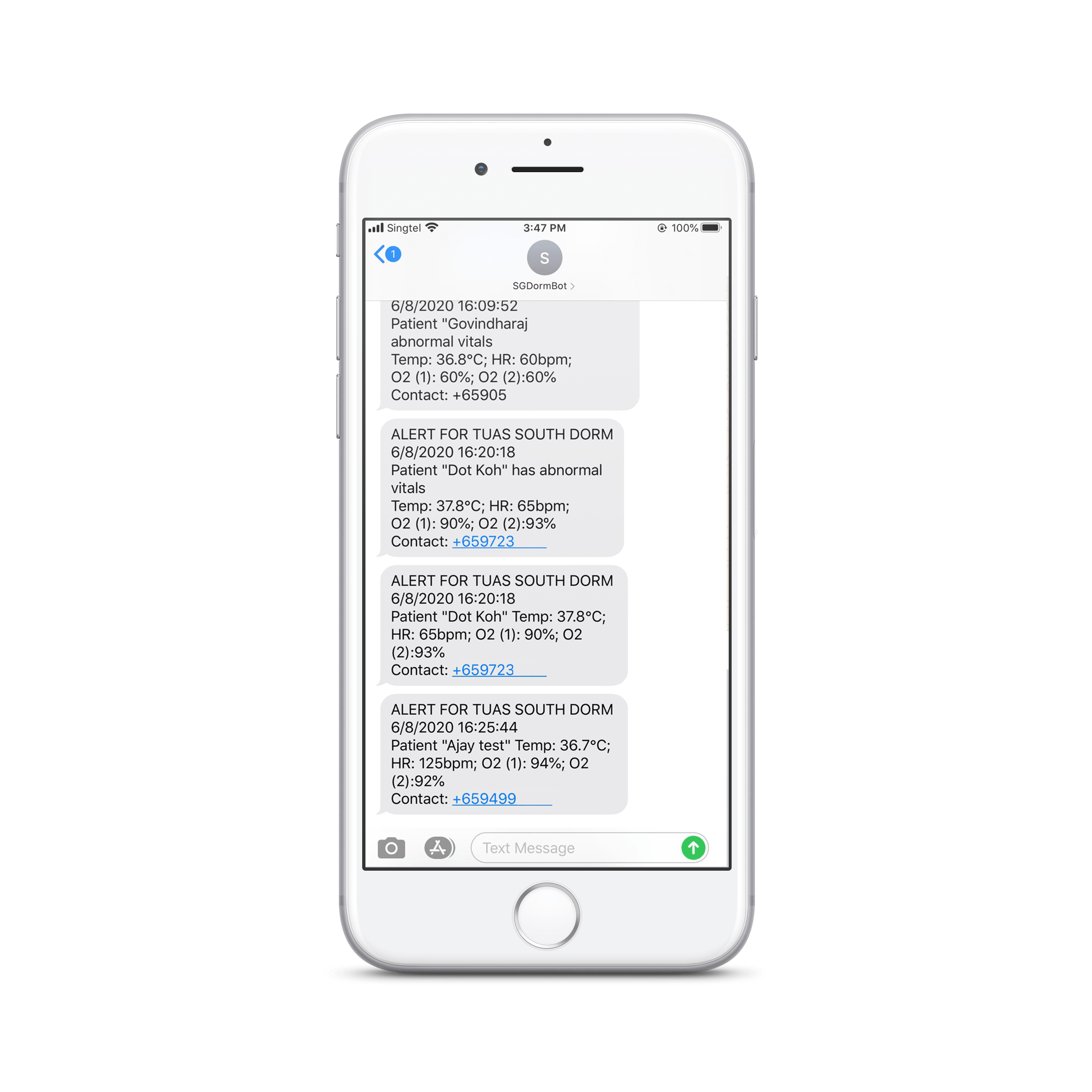NUHS and Bot MD launch SGDormBot - the first A.I.-powered bot for COVID-19 telehealth monitoring

- SGDormBot is the first AI-powered bot developed for clinicians to enable real-time monitoring and telehealth intervention of COVID-19 patients.
- In its initial rollout, SGDormBot has been used by over 1,000 patients in six dormitories under the care of NUHS.
- Over 90% of COVID-19 patients in these dormitories have reported their vitals daily allowing clinicians to monitor them and intervene in real time.
While rounding in the National University Hospital (NUH) one Saturday morning in May, Dr Jen Wei Ying and Dr Stephanie Ko received an SMS alerting them to a migrant worker who reported symptoms of chest pain. The doctors had been testing a new telehealth platform for migrant workers living in dormitories under the medical care of National University Health System (NUHS). Although the platform had not been rolled out yet in that dormitory, the worker had heard about it from a friend who participated in the initial testing phase. Dr Ko alerted the dormitory ground staff, who found him unwell with an abnormally fast heart rate. Within minutes, they activated an ambulance to transfer him to the National Centre for Infectious Diseases for further evaluation.
This new platform is SGDormBot - the first multilingual A.I.-powered bot developed for clinicians to enable the real-time monitoring and timely intervention of COVID-19 positive patients. It was developed and launched in partnership with A.I. healthcare startup Bot MD.
SGDormBot is currently being used by patients in six NUHS managed dormitories across Singapore. The COVID-19 outbreak was first reported in Singapore in January 2020 and over 36,000 cases have been reported since. The majority of infectious cases are migrant workers living in dormitories, making up over 93% of all reported cases to date. Frontline medical staff battling the virus have been concurrently deployed to dormitories and isolation facilities to provide medical care to affected workers. Despite the expansion of isolation facilities, there are significant numbers of COVID-suspected or positive migrant workers who continue to be housed in dormitories, where on-site medical coverage is only available for certain hours of a day.
“The COVID-19 outbreak amongst migrant workers in densely-packed dormitories has resulted in a public health crisis with complex, multi-dimensional problems. Tackling this requires an approach which not only addresses our healthcare and manpower resource constraint, but also considers social, cultural, educational and language issues.”

SGDormBot was developed to be easily accessed through widely available social messaging applications and provides a simple and user-friendly interface to remind COVID-19 positive residents to monitor their temperature, heart rate and oxygen levels in their native language. The bot also sends NUHS clinicians an instant SMS alert whenever there are abnormal vital signs reported, allowing them to intervene quickly through telehealth consultations.
"When we met and spoke with patients at dormitories, we realised that while they are avid users of mobile phones and chat apps, they interact with them differently. For example, many of them were not familiar with scanning QR codes or filling in online forms. Using these insights, we adapted the SGDormBot interface such that it was intuitive, useful and easy for them to use."

SGDormBot was first piloted in late April 2020 in Tuas South Dormitory. Migrant workers who tested positive for COVID-19 are asked to add SGDormBot on WhatsApp and the chat assistant would prompt for the user's language preference. Residents can use the platform to self-report their vital signs, and twice daily reminders are sent through WhatsApp to the patients in their native language.
"This was a very meaningful project for our team to work on, especially when we hear first-hand stories of the impact that SGDormBot has in helping NUHS clinicians intervene to save the lives of the COVID-19 positive patients. It really brings home the mission of our company to empower doctors and frontline medical workers."

Since the launch of the platform, more than 90 per cent of COVID-19 positive residents in NUHS managed dormitories have logged their vital signs daily. Nearly 500 alerts have been triggered and close to 100 teleconsultations have been held through the SGDormBot with the aid of layman volunteer translators. Of these teleconsultations, more than 20 residents have been identified for earlier medical review and 11 were escalated to hospitals for further treatment.
"SGDormbot has been a game changer in enabling us to keep a close watch over COVID-19 positive dormitory residents, in whom a subtle change in the vital signs may be the first sign of clinical deterioration. More than than, it has empowered residents to take on an active role in monitoring their own conditions, which has facilitated a better understanding of the virus and how it affects their health."

The SGDormBot project received a grant from the Temasek Foundation for development and enhancement.
The SGDormBot platform was built with the following factors in mind:
- Simplicity and accessibility: platforms familiar to migrant workers in their native language were used to encourage them to take ownership of their own health and work with the healthcare workers to monitor their health status.
- Health and safety of migrant workers: healthcare staff are automatically notified via SMS about residents who are unwell, so that prompt action can be taken.
- Safety for healthcare staff: the platform allows COVID-19 exposure to be minimised while providing the reassurance necessary for migrant workers by making healthcare professionals accessible to them. Video consults are done via a three-way call with a volunteer translator, so that all the patients’ concerns can be addressed.
- Scalable and cost-efficient: aside from the initial development and messaging costs, there are no recurring costs associated with the platform. It uses the patient’s own mobile device and existing monitoring equipment available in the dorms, as well as helps to conserve precious personal protective equipment.
About Bot MD
Bot MD is an A.I. clinical assistant for Doctors. The A.I. can be trained on hospital specific content to empower frontline medical workers with instant answers to their clinical questions. The platform allows hospitals and healthcare organisations to quickly integrate their content for instant search with zero development time. Bot MD's proprietary Natural Language Processing technology has been used by over 10,000 doctors globally. Partners include the National University Health System, National Cancer Institute Singapore, Tan Tock Seng Hospital, National Kidney Transplant Institute, MediLink Network and other leading hospital and medical associations around the world.
About National University Health System (NUHS)
The National University Health System (NUHS) aims to transform how illness is prevented and managed by discovering causes of disease, development of more effective treatments through collaborative multidisciplinary research and clinical trials, and creation of better technologies and care delivery systems in partnership with others who share the same values and vision.
Institutions in the NUHS Group include the National University Hospital, Ng Teng Fong General Hospital, Jurong Community Hospital and Alexandra Hospital; three National Specialty Centres - National University Cancer Institute, Singapore (NCIS), National University Heart Centre, Singapore (NUHCS) and National University Centre for Oral Health, Singapore (NUCOHS); the National University Polyclinics (NUP); Jurong Medical Centre; and three NUS health sciences schools – NUS Yong Loo Lin School of Medicine (including the Alice Lee Centre for Nursing Studies), NUS Faculty of Dentistry and NUS Saw Swee Hock School of Public Health.
With member institutions under a common governance structure, NUHS creates synergies for the advancement of health by integrating patient care, health science education and biomedical research.
As a Regional Health System, NUHS works closely with health and social care partners across Singapore to develop and implement programmes that contribute to a healthy and engaged population in the Western part of Singapore.
For more information, please visit http://www.nuhs.edu.sg.


